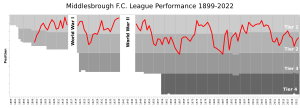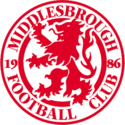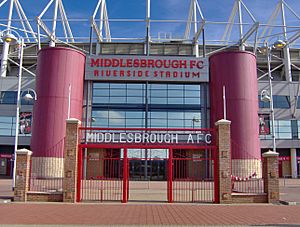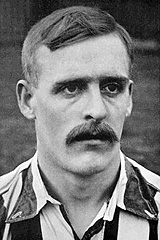Middlesbrough F.C. facts for kids
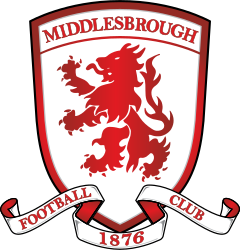 |
||
| Full name | Middlesbrough Football Club | |
|---|---|---|
| Nickname(s) |
|
|
| Short name | MFC, Boro | |
| Founded | 23 March 1876 | |
| Ground | Riverside Stadium | |
| Capacity | 34,742 | |
| Owner | Steve Gibson | |
| Chairman | Steve Gibson | |
| Head coach | Rob Edwards | |
| League | Championship | |
| 2018–19 | Championship, 7th of 24 | |
|
|
||
Middlesbrough Football Club, often called the Boro, is a professional football team. They are based in Middlesbrough, North Yorkshire, England. The club plays in the EFL Championship, which is the second-highest league in English football.
Middlesbrough was started in 1876. This makes them one of the oldest football clubs in England and Wales. Since 1995, their home stadium has been the Riverside Stadium. Before that, they played at Ayresome Park for 92 years.
The Boro was one of the first teams in the Premier League in 1992. They have spent most of their history in the top two divisions of English football. Their best league finish was third place in the 1913–14 season.
In 1986, the club almost closed down. But a group led by Steve Gibson saved them. After this, they quickly moved up two leagues. In 1997, they reached the finals of both the FA Cup and League Cup. They lost both finals.
Under manager Steve McClaren, Middlesbrough won their first major trophy. This was the League Cup in 2004. They also reached the 2006 UEFA Cup final in Europe.
Middlesbrough is the main professional football club in the Teesside area. They have local rivalries with Newcastle United and Sunderland. The team's traditional colours are red shirts with white details. Their crest usually features a lion.
Contents
Club History
Early Years and First Division (1876–1914)
Middlesbrough Football Club was formed in 1876. They won the FA Amateur Cup twice, in 1895 and 1898. The club became professional in 1889. They then became amateur again in 1892. In 1899, they turned professional for good.
After three seasons, they moved up to the Football League First Division. They stayed there for 22 years. In 1903, the club moved to Ayresome Park. This was their home for the next 92 years. In 1905, they bought Alf Common for £1,000. This was a record fee at the time.
Middlesbrough's performance in the top league varied. They finished sixth in 1907–08. Then they dropped to 17th two seasons later. Their highest league finish ever was third place in 1913–14. Football was then stopped because of the First World War.
Ups and Downs (1914–1966)
After the war, Middlesbrough struggled to keep their top form. They were relegated in 1923–24. But three seasons later, they won the Division Two title. During that season, George Camsell scored a record 59 league goals. He was the top scorer for the next 10 seasons.
Middlesbrough went up and down between divisions. They were promoted again in 1928–29. They stayed in the First Division until 1954. Before the Second World War, players like Wilf Mannion and George Hardwick became England internationals. The club was expected to challenge for the title. But the war stopped the leagues.
After the war, the team's performance dropped. They were relegated in 1953–54. This started a 20-year period outside the top division. During this time, Brian Clough became a top goalscorer for the club. He scored 204 goals in 222 games.
In 1950, Lindy Delapenha became the first Black player for Middlesbrough. He played 270 games and scored 92 goals. The club stayed in the Second Division. But they were never close to promotion. In 1966, they were relegated to the Football League Third Division for the first time.
Comeback and Financial Troubles (1966–1994)
New manager Stan Anderson quickly brought the club back to the second division. In 1973, Jack Charlton became manager. He led the team back to the top league. They won the Second Division title in 1974. They finished with a league record 65 points.
Middlesbrough won their first trophy as a professional team in 1975–76. They lifted the Anglo-Scottish Cup. In 1979, John Neal signed the club's first international player, Boško Janković.
In the mid-1980s, the club faced serious money problems. In 1986, Middlesbrough was relegated to the Third Division again. The club was almost shut down. But Steve Gibson put together a group to save it. They managed to register with the Football League just in time.
After this, Middlesbrough earned two promotions in a row. They went from the Third Division to the First Division. In 1992, Middlesbrough became one of the founding members of the Premier League.
Bryan Robson's Era (1994–2001)
Bryan Robson became player-manager in 1994. Middlesbrough bought famous players like Juninho and Fabrizio Ravanelli. The 1996–97 season was tough. The club lost three points because they couldn't play a game. This led to relegation. However, they reached both the League Cup and FA Cup finals for the first time. They lost both.
Even though they were in the second division, they reached the League Cup final again the next year. Middlesbrough was promoted back to the Premier League in 1998. They had a good run in 1998–99. They beat Manchester United 3–2 at Old Trafford.
The club stayed in the middle of the table. They signed more international players like Paul Ince and Christian Ziege. In 2000–01, Terry Venables joined as co-manager. This helped them avoid relegation. Bryan Robson left in 2001 after seven years.
Top Flight and European Adventures (2001–2009)
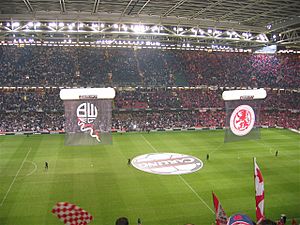
In June 2001, Steve McClaren became the new manager. In his first season, Middlesbrough finished 12th. They also reached the FA Cup semi-final.
The 2003–04 season was very important. Middlesbrough won their first major trophy. They beat Bolton Wanderers 2–1 in the League Cup final. This win meant they qualified for Europe. They played in the UEFA Cup the next season. They reached the last 16.
Middlesbrough qualified for the UEFA Cup again in 2005–06. They had an amazing cup run that season. They reached the 2006 UEFA Cup final. They had two incredible comebacks from 3–0 down in earlier rounds. But they lost 4–0 to Sevilla in the final. McClaren's teams had young local players like Stewart Downing. They also had experienced international players like Yakubu and Mark Viduka.
After the European final, McClaren left to manage the England team. Captain Gareth Southgate took over as manager. Southgate led the club to 12th place in his first season. In 2008, the club bought Brazilian striker Afonso Alves for a record £13.6 million. Middlesbrough was relegated to the Championship at the end of the 2008–09 season.
Decline, Brief Return, and Relegation (2009–2017)
Middlesbrough fired Gareth Southgate in October 2009. Gordon Strachan became manager. But the team's form got worse. Strachan resigned in 2010. Tony Mowbray took over. He left in October 2013 after a poor start to the season.
Aitor Karanka became the new manager. He was the first non-British manager for the club. In his first full season, Middlesbrough finished fourth. They qualified for the play-offs. They beat Brentford but lost to Norwich City in the final at Wembley Stadium.
The 2015–16 season ended dramatically. Middlesbrough needed one point from their last game to get automatic promotion. They drew the match and secured their return to the Premier League.
Middlesbrough dismissed Karanka in March 2017. The team was relegated after just one season back in the top league. They won only 5 league games that season.
Return to the Championship (2017–Present)
Garry Monk became manager in 2017. The club spent a lot of money on new players. They hoped to get promoted straight away. Monk left in December. Tony Pulis took over. Pulis led the team to finish 5th. But they lost in the play-off semi-finals to Aston Villa. The next season, they finished 7th and missed the play-offs by one point.
Jonathan Woodgate became manager in June 2019. He was a former Middlesbrough player. Woodgate was sacked in 2020. Neil Warnock replaced him. Warnock helped the team avoid relegation. They finished 17th.
On November 6, 2021, Middlesbrough parted ways with Warnock. Chris Wilder took over. Wilder was sacked after 11 months. The club was in 22nd place.
Former Manchester United player Michael Carrick was appointed manager. He led the Boro to a fourth-place finish. But they lost in the play-off semi-finals to Coventry City. On May 26, 2023, the club officially joined with the women's team. In the 2023–24 season, Middlesbrough reached the League Cup semi-finals. This was their first time since 2004. They beat Chelsea in the first game. But they lost 6–2 overall.
Team Colours and Crest
|
|
| Early Middlesbrough F.C. kit |
Middlesbrough's first home kit in 1899 was a white shirt with red shorts. The club's kit has mostly been the same since 1899. It is a red shirt with white details. The shorts and socks are either red or white.
The wide white stripe across the chest was added in 1973 by Jack Charlton. It was brought back for some seasons due to popular demand. In 2007, the club asked fans to vote online. They wanted to know if the white band should return for the 2008–09 season. On January 8, 2008, the club announced that 77.4% of voters wanted the white band back.
The Middlesbrough crest has changed four times. The first badge was the town's crest. It had a red lion to match the club's colours. In 1973, only the red lion remained with "M.F.C" below it. After the club was reformed in 1986, the crest became a circle. It had the lion in the middle and "Middlesbrough Football Club 1986" around it.
In 2007, Middlesbrough changed their crest again. The lion is now inside a shield. The words "Middlesbrough Football Club 1876" are underneath. Chairman Steve Gibson said this was to show the club's long history.
Kit Sponsors and Manufacturers
Middlesbrough's first sponsor was Datsun Cleveland in 1980. Over the years, they have had various sponsors. These include Cellnet, Dial-a-Phone, 888.com, and Garmin. From 2010, pawnbrokers Ramsdens became the main sponsor. Later, 32Red became the sponsor.
Italian company Erreà made Middlesbrough's kits from 1994 to 2009. Adidas then took over. They had also made kits from 1979 to 1983. Danish company Hummel made the kits from 1984 to 1987. They got the contract again in 2018. Erreà returned in 2022.
| Period | Kit manufacturer | Shirt sponsor |
|---|---|---|
| 1976–1977 | Bukta | None |
| 1977–1980 | Adidas | |
| 1980–1982 | Datsun Cleveland | |
| 1982–1984 | McLean Homes | |
| 1984–1986 | Hummel | Camerons |
| 1986–1987 | Dickens | |
| 1987–1988 | Skill | |
| 1988–1990 | Heritage Hampers | |
| 1990–1992 | Evening Gazette | |
| 1992–1994 | Admiral | ICI |
| 1994–1995 | Erreà | Dickens |
| 1995–2002 | BT Cellnet | |
| 2002–2004 | Dial-a-Phone | |
| 2004–2007 | 888.com | |
| 2007–2009 | Garmin | |
| 2009–2010 | Adidas | |
| 2010–2017 | Ramsdens | |
| 2017–2018 | Ramsdens Currency | |
| 2018–2022 | Hummel | 32Red |
| 2022–2025 | Erreà | Unibet |
| 2025– | Castore |
Home Stadiums
Middlesbrough first played at Albert Park in 1876. They then moved to Breckon Hill. In 1882, they moved to the Linthorpe Road ground. This was also home to Middlesbrough Cricket Club. The football club became the only user of the ground in 1893.
In 1903, the club moved to Ayresome Park. This stadium was designed by Archibald Leitch. It was the club's home for 92 years. It was also used for the 1966 FIFA World Cup. After a report in 1990, the club needed a new stadium. They moved out at the end of the 1994–95 season. Ayresome Park was later demolished.
The Riverside Stadium became the club's new home in 1995. Fans voted to choose its name. It was the first stadium built to meet new safety rules. It first held 30,000 people. It cost £16 million to build. It was later expanded to hold 35,100 fans.
The Riverside Stadium has been changed several times. In 2013–14, away fans moved to a different section. Home fans were placed behind both goals to make the atmosphere better. A large TV screen was also added. For the 2016–17 season, the stadium improved its broadcasting and lighting. This was to meet Premier League rules. As of the 2017–18 season, the stadium holds 34,742 people.
Supporters
Middlesbrough has one of the highest average attendances in England and Wales. Most supporters come from Middlesbrough and nearby towns. In 2001, 80% of season ticket holders were born locally. Also, 20% of their fans were female.
Middlesbrough fans are known for being loud. A survey in 2007–08 found them to be the seventh-loudest in the Premier League. The club has official supporters' clubs around the world. Some of the largest are the Official Supporters' Club and Red Faction.
Middlesbrough's main rivals are Newcastle United. This is called the Tyne–Tees derby. They also have a rivalry with Sunderland, known as the Tees–Wear derby. Leeds United is another rival.
The nickname Smoggies was first used by rival fans. It referred to the industrial air pollution in the town. But Middlesbrough fans later adopted it with pride. You might see banners at away games saying "Smoggies on Tour". UEFA praised Middlesbrough fans for their good behaviour during the 2005–06 UEFA Cup campaign.
Media and Community
Middlesbrough was the first football club to launch its own TV channel, Boro TV. This happened in 1997. It was a year before Manchester United's MUTV. The channel showed delayed full-match footage of league games. Boro TV ran until 2005. The club now shows match highlights on its website.
Middlesbrough's official matchday programme, Redsquare, won an award in 2006–07. There are also fan magazines, like Fly Me to the Moon.
Middlesbrough Football Club in the Community (MFCIC) was started in 1996. It is one of the biggest community football programs in the UK. It works separately from the club. But it gets support from the club and local groups. In 2012, MFCIC became MFC Foundation. The Foundation uses the club's fame to help communities. They run sports, health, education, and inclusion projects. Since 1996, the Foundation has helped over 500,000 people.
Since 2002, the club has also run the Middlesbrough Enterprise Academy. This program helps children learn business skills. In 2008, the Premier League planned to use this idea across the country.
In 2007, Middlesbrough did more community work than any other Premier League club. They made 318 appearances, almost double the average. They were also in the top two in 2007–08.
Middlesbrough's mascot is Roary the Lion. The club also runs Roary's Children's Charity Fund. This fund buys things for local children's charities.
In 2009, a steel plant in Teesside faced closure. This put 4,000 jobs at risk. Middlesbrough Football Club helped the "Save Our Steel" campaign. They hosted steel workers at the stadium. Players wore T-shirts to support the campaign. Chairman Steve Gibson said the club exists for the community. He wanted to help the steelworkers and their families.
European Football
| Middlesbrough in Europe | ||||||||
|---|---|---|---|---|---|---|---|---|
| Season | Competition | Round | Country | Club | Home | Away | Aggregate | |
| 2004–05 | UEFA Cup | First round | Baník Ostrava | 3–0 | 1–1 | 4–1 | ||
| Group E | Egaleo | N/A | 0–1 | 1st | ||||
| Lazio | 2–0 | N/A | ||||||
| Villarreal | N/A | 0–2 | ||||||
| Partizan Belgrade | 3–0 | N/A | ||||||
| Round of 32 | GAK | 2–1 | 2–2 | 4–3 | ||||
| Round of 16 | Sporting Lisbon | 2–3 | 0–1 | 2–4 | ||||
| 2005–06 | UEFA Cup | First round | Skoda Xanthi | 2–0 | 0–0 | 2–0 | ||
| Group D | Grasshoppers Zürich | N/A | 0–1 | 1st | ||||
| Dnipro Dnipropetrovsk | 3–0 | N/A | ||||||
| AZ Alkmaar | N/A | 0–0 | ||||||
| Litex Lovech | 2–0 | N/A | ||||||
| Round of 32 | Stuttgart | 0–1 | 2–1 | 2–2a | ||||
| Round of 16 | Roma | 1–0 | 1–2 | 2–2a | ||||
| Quarter-final | Basel | 4–1 | 0–2 | 4–3 | ||||
| Semi-final | Steaua Bucharest | 4–2 | 0–1 | 4–3 | ||||
| Final | Sevilla | 0–4 | ||||||
Club Staff
Coaching Team
Academy Coaches
Managers Through the Years
Here are the full-time managers for Middlesbrough since 1899:
|
|
Players
Current Squad
|
|
Players on Loan
|
|
Middlesbrough Legends
These 10 players were chosen by fans as club legends.
 George Camsell
George Camsell George Hardwick
George Hardwick Wilf Mannion
Wilf Mannion Brian Clough
Brian Clough John Hickton
John Hickton Willie Maddren
Willie Maddren Tony Mowbray
Tony Mowbray Bernie Slaven
Bernie Slaven Juninho
Juninho Gareth Southgate
Gareth Southgate
Top Appearances
These players have played more than 430 games for the club. The number in brackets shows total games played.
- Tim Williamson (602)
- Gordon Jones (532)
- John Hickton (499)
- John Craggs (487)
- Jim Platt (481)
- George Camsell (453)
- Jacky Carr (449)
- Mark Schwarzer (446)
- David Armstrong (431)
Top Goalscorers
These players scored more than 140 goals for the club. The number in brackets shows total goals scored.
- George Camsell (345)
- George Elliott (213)
- Brian Clough (204)
- John Hickton (193)
- Micky Fenton (162)
- Bernie Slaven (146)
- Alan Peacock (141)
Player of the Year Awards
|
|
|
|
|
Football League 100 Legends
The Football League created a list of 100 legendary players in 1998. This was to celebrate 100 seasons of League football. These players were part of Middlesbrough at some point:
- Alf Common
- George Camsell
- Steve Bloomer
- Wilf Mannion
- George Hardwick
- Nobby Stiles
- Graeme Souness
- Bryan Robson
- Paul Gascoigne
English Football Hall of Fame
The English Football Hall of Fame is in Manchester. It celebrates great English footballers and those who played in England. These players or managers were part of Middlesbrough:
- Brian Clough (2002 inductee)
- Paul Gascoigne (2002 inductee)
- Bryan Robson (2002 inductee)
- Viv Anderson (2004 inductee)
- Wilf Mannion (2004 inductee)
- Jack Charlton (2005 inductee)
- Graeme Souness (2007 inductee)
- Nobby Stiles (2007 inductee)
- Terry Venables (2007 inductee)
- Steve Bloomer (2008 inductee)
- Malcolm Allison (2009 inductee)
- Raich Carter (2013 inductee)
- Paul Ince (2021 inductee)
Scottish Football Hall of Fame
These former Middlesbrough players and managers are in the Scottish Football Hall of Fame:
- Bobby Murdoch (2004 inductee)
- Graeme Souness (2004 inductee)
- Gordon Strachan (2007 inductee)
Club Achievements
Middlesbrough has won several titles and cups:
League Titles
- Second Division / First Division / Championship (Second Level)
- Champions: 1926–27, 1928–29, 1973–74, 1994–95
- Runners-up: 1991–92, 1997–98, 2015–16
- Play-off winners: 1988
- Third Division (Third Level)
- Runners-up: 1966–67, 1986–87
- Northern League
- Champions: 1893–94, 1894–95, 1896–97
Cup Wins
- FA Cup
- Runners-up: 1996–97
- League Cup
- Winners: 2003–04
- Runners-up: 1996–97, 1997–98
- Full Members' Cup
- Runners-up: 1989–90
- FA Amateur Cup
- Winners: 1894–95, 1897–98
- UEFA Cup
- Runners-up: 2005–06
- Anglo-Scottish Cup
- Winners: 1975–76
- North Riding Senior Cup
- Winners on 55 occasions since 1882
- Kirin Cup
- Winners: 1980
Middlesbrough Women's Team
Middlesbrough Women is the women's football club. It is linked to the men's team. It started as Cleveland Spartans in 1976. In 2023, it officially joined with the men's team. They play in the FA Women's National League Division One North. This is the fourth level of women's football in England.
See also
 In Spanish: Middlesbrough Football Club para niños
In Spanish: Middlesbrough Football Club para niños
 | Laphonza Butler |
 | Daisy Bates |
 | Elizabeth Piper Ensley |


